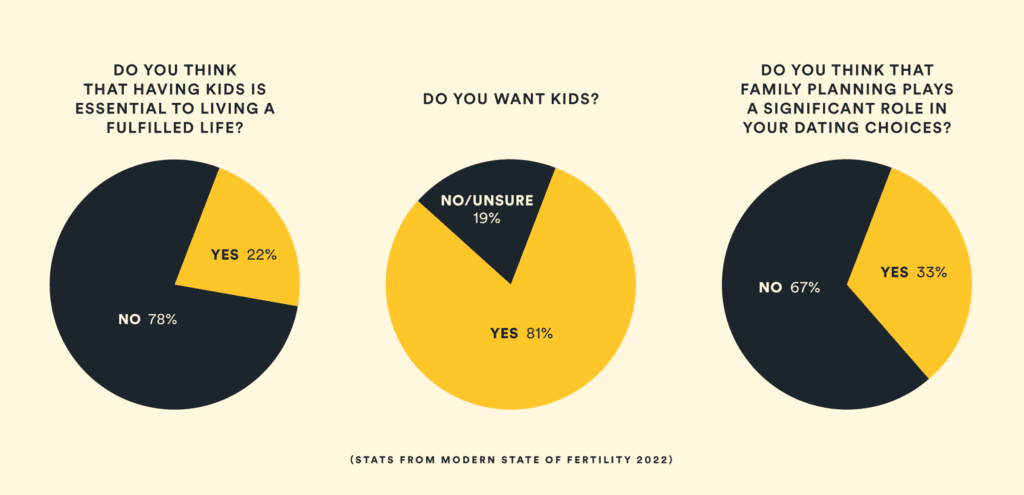The COVID-19 pandemic has made many of us change how we see our goals, our relationships, and ourselves over the past two years. No part of our lives has been untouched, and that includes how folks are thinking about their relationship priorities and family planning. Bumble partnered with reproductive health company Modern Fertility to conduct a survey in February 2022 of more than 6,600 people to ask how they’re feeling about dating, relationships, and fertility decisions right now. This is what we found:
A fulfilled life doesn’t necessarily include children
More than three quarters (78%) of respondents don’t think that having kids is essential to living a fulfilled life. In fact, about one in five respondents (19%) don’t want children or are unsure if they want children. And this is reflected in other parts of people’s lives as well: folks are now delaying family planning in favor of other pursuits, like hobbies, careers, financial goals, and travel. It’s also affecting the dating landscape: Two thirds of respondents (67%) don’t think that family planning plays a significant role in their dating choices or dating life.
Alignment on family planning isn’t the top priority
Overall, when it comes to choosing a partner, both women* and men* surveyed say that agreement on having kids isn’t the first or second most important thing they’re looking for in a partner. For women, the most important factors are (in this order): shared values, shared financial goals, aligned career stability, and shared family planning goals. For men, the most important factors are (in this order): shared values, shared financial goals, aligned family planning goals, and desire to live in certain locations. (If you don’t know what factors would be most important to you in a relationship, see here.)
However, for the single people who know that they do want kids, alignment on family planning is a bigger priority. Of the single respondents who want children, over half (58%) of men and almost half (48%) of women say it’s a dealbreaker when the other person doesn’t want kids at all.

Those who do want kids are dating differently
For folks who know that they want children, COVID has changed how they date. Of the single respondents who want kids, over one in four (27%) want to move more quickly with dating and relationships in order to make up for time lost to the pandemic, and nearly a third (29%) report being more upfront about family planning goals since the pandemic. And family planning is a topic that most respondents weren’t afraid to bring up: 55% of those surveyed say that they’re open to sharing their family planning goals within the first few dates, and 35% of respondents said they’re comfortable bringing up fertility within the first few dates and asking the other person about their family plans. (And we’ve got great pointers on how to have that conversation here.)
Men are more open to proactively sharing family planning goals than women. More than three quarters (78%) of surveyed men who want kids feel comfortable talking about that on the first few dates, versus less than half (48%) of surveyed women who want kids. That’s also reflected in dating app profiles: of those who responded, 81% of men who want kids say they’ll share that in their dating profile, compared to only 48% of women who want kids.
Folks are looking into assisted reproductive technology
Over half of (57%) of respondents who want children say they’re open to having biological kids (or more kids) with a partner using assisted reproductive technology, or ART (e.g. egg freezing, artificial insemination, IVF, etc). More than three quarters (78%) of men respondents who want kids are open to having biological children with a partner using some assisted reproductive technology, compared with 53% of women who want kids. Surveyed men who want children are also more open to having biological kids (or more kids) with a partner through a surrogate: 42% compared to 23% of women who want children. However, women respondents are much more open to becoming a single parent via ART or adoption than men, with 53% of women open to it compared to only 16% of men. For LGBTQ+ respondents who often rely on ART or adoption, 71% are open to adopting a child.
This data might line up with how you’ve been feeling lately about dating, relationships, and having kids—or it might not! Either way, we hope it helps you understand the post-COVID dating landscape and feel empowered to go after the kinds of connections that you want.
*Note: When we talk about “women” and “men,” we are referencing survey respondents who self-identified this way, including cisgendered men and women, trans men and women, and other folks along the gender spectrum.




Social Media